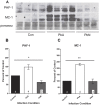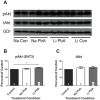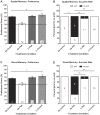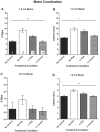Altered regulation of Akt signaling with murine cerebral malaria, effects on long-term neuro-cognitive function, restoration with lithium treatment
- PMID: 23082110
- PMCID: PMC3474787
- DOI: 10.1371/journal.pone.0044117
Altered regulation of Akt signaling with murine cerebral malaria, effects on long-term neuro-cognitive function, restoration with lithium treatment
Abstract
Neurological and cognitive impairment persist in more than 20% of cerebral malaria (CM) patients long after successful anti-parasitic treatment. We recently reported that long term memory and motor coordination deficits are also present in our experimental cerebral malaria model (ECM). We also documented, in a murine model, a lack of obvious pathology or inflammation after parasite elimination, suggesting that the long-term negative neurological outcomes result from potentially reversible biochemical and physiological changes in brains of ECM mice, subsequent to acute ischemic and inflammatory processes. Here, we demonstrate for the first time that acute ECM results in significantly reduced activation of protein kinase B (PKB or Akt) leading to decreased Akt phosphorylation and inhibition of the glycogen kinase synthase (GSK3β) in the brains of mice infected with Plasmodium berghei ANKA (PbA) compared to uninfected controls and to mice infected with the non-neurotrophic P. berghei NK65 (PbN). Though Akt activation improved to control levels after chloroquine treatment in PbA-infected mice, the addition of lithium chloride, a compound which inhibits GSK3β activity and stimulates Akt activation, induced a modest, but significant activation of Akt in the brains of infected mice when compared to uninfected controls treated with chloroquine with and without lithium. In addition, lithium significantly reversed the long-term spatial and visual memory impairment as well as the motor coordination deficits which persisted after successful anti-parasitic treatment. GSK3β inhibition was significantly increased after chloroquine treatment, both in lithium and non-lithium treated PbA-infected mice. These data indicate that acute ECM is associated with abnormalities in cell survival pathways that result in neuronal damage. Regulation of Akt/GSK3β with lithium reduces neuronal degeneration and may have neuroprotective effects in ECM. Aberrant regulation of Akt/GSK3β signaling likely underlies long-term neurological sequelae observed in ECM and may yield adjunctive therapeutic targets for the management of CM.
Conflict of interest statement
Figures









Similar articles
-
A Neuroprotective Effect of the Glutamate Receptor Antagonist MK801 on Long-Term Cognitive and Behavioral Outcomes Secondary to Experimental Cerebral Malaria.Mol Neurobiol. 2017 Nov;54(9):7063-7082. doi: 10.1007/s12035-016-0226-3. Epub 2016 Oct 28. Mol Neurobiol. 2017. PMID: 27796746
-
Effects of anti-tau immunotherapy on reactive microgliosis, cerebral endotheliopathy, and cognitive function in an experimental model of cerebral malaria.J Neurochem. 2023 Nov;167(3):441-460. doi: 10.1111/jnc.15972. Epub 2023 Oct 9. J Neurochem. 2023. PMID: 37814468 Free PMC article.
-
Neuregulin-1 attenuates experimental cerebral malaria (ECM) pathogenesis by regulating ErbB4/AKT/STAT3 signaling.J Neuroinflammation. 2018 Apr 10;15(1):104. doi: 10.1186/s12974-018-1147-z. J Neuroinflammation. 2018. PMID: 29636063 Free PMC article.
-
Statins decrease neuroinflammation and prevent cognitive impairment after cerebral malaria.PLoS Pathog. 2012 Dec;8(12):e1003099. doi: 10.1371/journal.ppat.1003099. Epub 2012 Dec 27. PLoS Pathog. 2012. PMID: 23300448 Free PMC article.
-
Is lithium neuroprotective? An updated mechanistic illustrated review.Fundam Clin Pharmacol. 2023 Feb;37(1):4-30. doi: 10.1111/fcp.12826. Epub 2022 Aug 30. Fundam Clin Pharmacol. 2023. PMID: 35996185 Review.
Cited by
-
The Einstein-Brazil Fogarty: A decade of synergy.Braz J Microbiol. 2015 Oct-Dec;46(4):945-55. doi: 10.1590/S1517-838246420140975. Braz J Microbiol. 2015. PMID: 26691452 Free PMC article. Review.
-
A Neuroprotective Effect of the Glutamate Receptor Antagonist MK801 on Long-Term Cognitive and Behavioral Outcomes Secondary to Experimental Cerebral Malaria.Mol Neurobiol. 2017 Nov;54(9):7063-7082. doi: 10.1007/s12035-016-0226-3. Epub 2016 Oct 28. Mol Neurobiol. 2017. PMID: 27796746
-
Disparate Effects of Lithium and a GSK-3 Inhibitor on Neuronal Oscillatory Activity in Prefrontal Cortex and Hippocampus.Front Aging Neurosci. 2018 Jan 12;9:434. doi: 10.3389/fnagi.2017.00434. eCollection 2017. Front Aging Neurosci. 2018. PMID: 29375364 Free PMC article.
-
Endothelin-1 Mediates Brain Microvascular Dysfunction Leading to Long-Term Cognitive Impairment in a Model of Experimental Cerebral Malaria.PLoS Pathog. 2016 Mar 31;12(3):e1005477. doi: 10.1371/journal.ppat.1005477. eCollection 2016 Mar. PLoS Pathog. 2016. PMID: 27031954 Free PMC article.
-
Endothelin-1 Treatment Induces an Experimental Cerebral Malaria-Like Syndrome in C57BL/6 Mice Infected with Plasmodium berghei NK65.Am J Pathol. 2016 Nov;186(11):2957-2969. doi: 10.1016/j.ajpath.2016.07.020. Epub 2016 Sep 15. Am J Pathol. 2016. PMID: 27640146 Free PMC article.
References
-
- Carter JA, Ross AJ, Neville BG, Obiero E, Katana K, et al. (2005) Developmental impairments following severe falciparum malaria in children. Trop Med Int Health 10: 3–10. - PubMed
-
- Falchook GS, Malone CM, Upton S, Shandera WX (2003) Postmalaria neurological syndrome after treatment of Plasmodium falciparum malaria in the United States. Clin Infect Dis 37: e22–24. - PubMed
Publication types
MeSH terms
Substances
Grants and funding
- R01 NS069577/NS/NINDS NIH HHS/United States
- D43 TW007129/TW/FIC NIH HHS/United States
- AI076248/AI/NIAID NIH HHS/United States
- T32 NS007098-31/NS/NINDS NIH HHS/United States
- T32 HL07675/HL/NHLBI NIH HHS/United States
- T32 HL007675/HL/NHLBI NIH HHS/United States
- Wellcome Trust/United Kingdom
- T32 NS007098/NS/NINDS NIH HHS/United States
- R01 AI076248/AI/NIAID NIH HHS/United States
- R01 AI039454/AI/NIAID NIH HHS/United States
- NS041282/NS/NINDS NIH HHS/United States
- R01 NS041282/NS/NINDS NIH HHS/United States
- L32 MD002222/MD/NIMHD NIH HHS/United States
- T32 AI070117/AI/NIAID NIH HHS/United States
- AI39454/AI/NIAID NIH HHS/United States
- NS069577/NS/NINDS NIH HHS/United States
- T32AI070117/AI/NIAID NIH HHS/United States
LinkOut - more resources
Full Text Sources
Molecular Biology Databases
Miscellaneous

